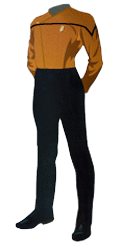Duty Posts/Operations Division
| Divisions and Personnel Assignments |
|---|
| COMMAND DIVISION | OPERATIONS DIVISION | SCIENCES DIVISION | MARINE CORPS | CIVILIAN CONTINGENT |
The departments within the Operations Division comprise the largest segment of a crew. These men and women are vital to keeping a starship working and defending her from the dangers encountered on the frontier.
Helm, Communications and Operations
Main article: Helm/Com/Ops (Duty Post)
The Helm/Com/Ops (HCO) Officer is responsible for all flight control operations of the ship. He/she is also responsible for co-ordinating ship activities in such a manner so as not to overload or oversubscribe any particular system/resource. The HCO Officer also monitors the away team(s) status when not onboard the ship. The HCO Officer also handles all communications both to and from the ship. Even though most of the functions in flight are automated, an officer is needed to oversee these operations and sometimes, make changes. During impulse powered flight, the HCO Officer is responsible for monitoring inertial dampening systems and relativistic effects. In the event of overload in a specific flight operation, the computer will request a change in the manoeuvre. The HCO Officer must then bring the plans into the inertial dampening perimeters for safety. During alert situations the HCO Officer is permitted to specify manoeuvres that are possibly dangerous to the crew of spacecraft. In larger starships or starbases, where there is a robust operations department, transporter officers, tasked with the day to day operation of the transporter systems, report to the Chief of Operations. If the Chief of Operations position is vacant, transporter officers report to the Chief Engineer. SecurityMain article: Security (Duty Post)
The Security Officer is responsible for the security of the ship and all persons aboard. At least one Security Officer should accompany all away teams. The Security Officer monitors the internal status of the ship using internal sensors, and is ready to deal with any emergencies as they arise. The Security Officer must also keep the CO apprised of any such events. Chief of Security: The Chief of Security must carry out all of the above duties, but has further duties to perform. He/she must also co-ordinate the security teams on the vessel to deal with crises with maximum efficiency and to give the vessel maximum security coverage. The Chief of Security is also responsible for providing the First Officer with regular departmental reports and updates, as well as ensuring that duty rosters are conformed to. Notes: The Security station has two separate modes of security. The first, is the lower tier of the panel, watching over the basic, low-level security of the crew, the next, is the upper tier of the panel, which is activated during diplomatic and cultural missions. This tier is automatically activated to provide security for ambassadorial personnel or other important visitors but can be altered by the CSO to provide more or different security measures. An even higher level security can be activated when sabotage or terrorist actions are predicted. TacticalMain article: Tactical (Duty Post)
The Tactical Officer manipulates the external sensors (on all ranges) to evaluate any potential external threats to the ship and must keep the Commanding Officer (CO) appraised of any or all dangers found. He/she is responsible for making sure that all tactical systems are ready for use at any time, should they be required. The Tactical Officer is also responsible for operating any or all defensive or offensive systems (shields, phasers, torpedoes etc) as ordered by the CO. The Tactical Officer provides the CO with data on the surrounding area including vessels, anomalies etc. This data is gathered from the sensor arrays. EngineeringMain article: Engineering (Duty Post)
Engineering Officers are basically responsible for the physical welfare of the ship. They ensure that all systems are working within carefully defined parameters and that any systems that are not operating within tolerances are repaired. They also carry out standard maintenance, and innovation of the ship's systems The Engineering Officer must be particularly versatile in times of crisis when emergency repairs/upgrades/alterations could be the difference between life and death for the entire crew. Chief Engineer: The Chief Engineer co-ordinates the efficient running of the Engineering department and is responsible for the activities of the personnel therein. It is the CE's job to ensure that the engineering personnel are organised to ensure maximum productivity. Transporter repair technicians, responsible for the maintenance and fixes to the transporter system, are under the purview of the Chief Engineer. | ||||||||
| Mission Specialist | Helm/Com/Ops | Engineer | Science Officer | Medical Officer | Nurse |
| Intelligence Officer | Security Officer | Tactical Officer | Marine | Counselor | Civilian |
| Duty Posts |
|---|
















